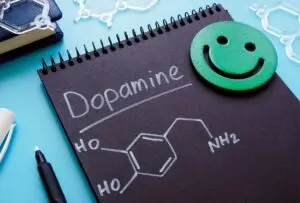Hormones are essential to many bodily functions and at the center of your sexual health. A hormone is a chemical substance produced by an endocrine gland that has a specific effect on the activities of other organs in the body. The major sex hormones can be classified as estrogens or androgens. Both classes of hormones are present in males and females alike, but in vastly different amounts.
Most men produce 8-10 mg of testosterone (an androgen) per day, compared to most women who produce 0.5mg of testosterone per day. Estrogens are also present in both sexes, but in larger amounts for women.
The Importance of Estrogen
Estrogens are the sex hormones produced primarily by a female’s ovaries that stimulate the growth of a woman’s sex organs, as well as her breasts and pubic hair, known as secondary sex characteristics. Estrogens also regulate the functioning of the menstrual cycle.
In the majority of women, ovarian hormones appear not to play a significant role in their sex drive. In one study of women under the age of 40, 90 percent reported experiencing no change in sexual desire or functioning after sex hormone production was shut down because of the removal of both ovaries.
In women, estrogens are important in maintaining the condition of the vaginal lining and its elasticity, and in producing vaginal lubrication. They also help preserve the texture and function of a woman’s breasts.
In men, estrogens have no known function. An unusually high level, however, may reduce sexual appetite, cause erectile difficulties, produce some breast enlargement, and result in the loss of body hair in some men.
Testosterone’s Function in Men & Women
Testosterone is a hormone classified as an androgen. Androgens are sex hormones produced primarily by a male’s testes, but are also produced in small amounts by the female’s ovaries and the adrenal gland, an organ found in both sexes.
Androgens help trigger the development of the testes and penis in the male fetus. They jump start the process of puberty and influence the development of facial, body and pubic hair, deepening of the voice, and muscle development, the male secondary sex characteristics.
After puberty, androgens, specifically testosterone, play a role in the regulation of the sex drive. Large deficiencies of testosterone may cause a drop in sexual desire, while excessive testosterone may heighten sexual interest in both sexes. However, testosterone levels are poorly correlated with sexual interest and drive when they are within the average range. Sex drive is much more likely to be affected by external stimuli than by variations in sex hormones, except in extreme cases.
In men, too little testosterone may cause difficulty obtaining or maintaining erections, but it is not clear whether testosterone deficiencies interfere with female sexual functioning apart from reducing desire.
However, there is no evidence whatsoever to suggest that because women have less testosterone than men do, they have lower sexual interest than their male counterparts. Instead, it seems that women detect and react to much smaller amounts of testosterone in their circulation than men do.
What else affects hormone balance?
Aging, illness and certain cancer treatments can affect our bodies’ delicate hormonal balance, causing changes in sexual interest and functioning. Familiar to most are the changes that occur when a woman goes through menopause. Estrogen production drops throughout this process as a woman exits her child-bearing years.
The major sexual impact of decreased estrogen is a shrinking of the vagina and thinning of the vaginal walls, along with a loss of elasticity and decreased vaginal lubrication during sexual arousal. Some women experience only slight changes in sexual functioning, while others have dryness and pain with intercourse, or genital soreness for a few days after sexual activity, if they don’t use a vaginal lubricant or take some form of hormone replacement.
Researchers investigating the effects of hormone replacement therapy for women on sexual functioning have shown that taking estrogen often allows sexual functioning to return to normal. In addition, androgens have been prescribed for postmenopausal women to enhance their sexual desire.
Hormone-Replacement Therapy
Perhaps less well known is the fact that men sometimes experience lowered testosterone levels, which can be responsible for sexual dysfunction. How this hormonal decrease affects the man’s sex drive and erections remains unclear. There is a great deal yet to be learned about which men and women may require and benefit from hormone-replacement therapy.
It is tempting to try to understand sexual behavior solely in terms of hormones. In many animal species hormones that control the female’s willingness to mate and the courtship and sexual behavior of the male tightly regulate patterns of sexual behavior.
In humans, however, there is a more complicated relationship between hormones and sexual behavior. Although a substantial testosterone deficiency usually reduces sexual interest in men and women, there are cases in which that effect is not seen.
Similarly, although many men with below normal testosterone levels have difficulty with erections, not all do. Women who have low amounts of estrogen in their bodies do not lose their ability to be sexually aroused or to have orgasms.
In short, sex hormones are not the only factors affecting sexual interest or behavior.
Find a Forum Health Clinic nearby and schedule a consultation today.
If you are concerned about your hormone levels and whether they may be affecting your general health or your sexual functioning, consult your Forum Health provider for blood work.






